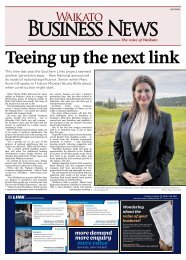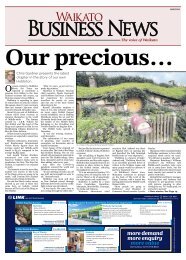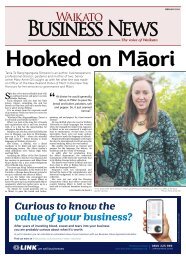Waikato Business News January/February 2017
Waikato Business News has for a quarter of a century been the voice of the region’s business community, a business community with a very real commitment to innovation and an ethos of co-operation.
Waikato Business News has for a quarter of a century been the
voice of the region’s business community, a business community
with a very real commitment to innovation and an ethos of
co-operation.
Create successful ePaper yourself
Turn your PDF publications into a flip-book with our unique Google optimized e-Paper software.
WAIKATO BUSINESS NEWS <strong>January</strong>/<strong>February</strong> <strong>2017</strong> 15<br />
The importance of coaching your people<br />
Everest Group is in the business of creating<br />
exceptional workplaces and one way we<br />
are particularly passionate about doing<br />
this is through developing the leadership<br />
capability of managers – as a leader, as a<br />
manager and as a coach.<br />
These three activities are<br />
complementary and are<br />
required to achieve business<br />
objectives, by enabling<br />
teams and individual team<br />
members to be self-led high<br />
performers.<br />
When managers are<br />
LEADING, they create and<br />
share a vision of the future with<br />
their team and ensure that their<br />
activities are consistent with<br />
bringing about those objectives.<br />
When managers are<br />
MANAGING, they deliver<br />
results to the organisation<br />
by controlling the work of the<br />
team, and agreeing and moni-<br />
toring such things as budgets,<br />
timescales and quality levels.<br />
When managers are<br />
COACHING, they support their<br />
team members in their learning,<br />
to enable them to develop<br />
the skills, knowledge and attitude<br />
necessary to successfully<br />
deliver their job responsibilities<br />
and goals. Without coaching, a<br />
manager’s leadership practice is<br />
like a three-legged stool balancing<br />
on two-legs.<br />
We commonly hear that<br />
business demands prevent<br />
managers from having regular<br />
coaching conversations with<br />
their staff. That’s not to say that<br />
coaching isn’t planned in many<br />
of these cases, but commonly<br />
it’s the first thing a manager<br />
will bump in the face of competing<br />
priorities - a practice that<br />
seems reasonably innocuous at<br />
face value, but over time it can<br />
be perilous to performance.<br />
In subtle and not so subtle<br />
ways, lack of quality interaction<br />
with staff can compromise<br />
an employee’s confidence, their<br />
skill level and potential, their<br />
sense of value, their faith in<br />
leadership, and ultimately their<br />
engagement and contribution.<br />
A people leader’s highest<br />
value contribution to an organisation<br />
is to keep their people<br />
working at high performance.<br />
Coaching is about facilitating<br />
the performance, learning<br />
and development of another. At<br />
its foundation is the belief that<br />
people are not their behaviours,<br />
behaviours can change, and<br />
high performance is achievable<br />
and sustainable. This requires<br />
the manager to develop strong<br />
interpersonal skills and a commitment<br />
to grow the potential<br />
of others.<br />
Ask, don’t tell: Pure coaching<br />
is about asking good questions<br />
and engaging the brain<br />
of the coachee, thus developing<br />
self-led high performing<br />
people, conversation by conversation.<br />
Engaging the brain<br />
ensures that they do the thinking,<br />
and connect the dots, that<br />
results in behaviour change. It<br />
takes time and intention to do<br />
this well.<br />
Unfortunately, fast paced,<br />
demanding work environments<br />
Small businesses upbeat about year ahead<br />
New Zealand small businesses<br />
finished 2016<br />
on an upbeat note, with<br />
confidence at its highest levels<br />
in almost two years, according<br />
to ANZ’s quarterly <strong>Business</strong><br />
Micro Scope survey of small<br />
firms.<br />
A net 20 percent of respondents<br />
- up from 17 percent in the<br />
September quarter - say they<br />
are confident about the business<br />
environment in the year<br />
ahead.<br />
Within this group, micro<br />
firms’ (0-5 employees) confidence<br />
rose a solid 5 points to<br />
+14, while intermediate firms<br />
held steady on +26.<br />
The ANZ composite measure<br />
– a key proxy for growth<br />
– lifted to +20 during the quarter.<br />
The composite measure is<br />
based on firms’ activity outlook,<br />
hiring, investment and<br />
profit expectations, all which<br />
improved in the quarter.<br />
“It was a storming finish<br />
to a good year for New<br />
Zealand’s small businesses,”<br />
said Andrew Webster, general<br />
manager retail and business<br />
banking. “If the confidence<br />
plays out, <strong>2017</strong> will be an<br />
excellent year for small businesses<br />
with a net 34 percent<br />
expecting a lift in activity for<br />
their business over the next 12<br />
months.”<br />
The composite growth<br />
measure lifted across all five<br />
regions – Wellington leads<br />
the way followed closely by<br />
regional South Island.<br />
Auckland continues a gradual<br />
climb while growth prospects<br />
in regional North Island<br />
and Canterbury have started to<br />
gain more momentum.<br />
“While overall sentiment<br />
and growth prospects are positive,<br />
concern about finding<br />
skilled staff continues to create<br />
a potential wedge between<br />
growth prospects and actual<br />
growth. Competition and<br />
regulation are also seen as<br />
obstacles to businesses realising<br />
their growth potential in<br />
<strong>2017</strong>,” Andrew said.<br />
Growth prospects for four<br />
of the five sectors improved<br />
in December with construction<br />
and services leading the way.<br />
MANAGEMENT AND HR<br />
> BY LIBBY GAIRDNER<br />
Coach and Trainer, Everest Group Limited,<br />
Creating Exceptional Workplaces, wwweverestgroup.co.nz<br />
tend to generate quite the opposite<br />
behaviour. Managers fall<br />
into the trap of driving results<br />
through readily giving the<br />
answers and telling people what<br />
to do. If this is the norm for<br />
their ‘coaching’ conversations,<br />
it achieves instant results at the<br />
expense of capacity development.<br />
As a general rule of<br />
thumb, the ratio for coach talking<br />
compared with coachee is<br />
approximately 20/80; that is,<br />
the coachee is encouraged to<br />
do most of the talking. To do<br />
this well, the main tools a manager<br />
needs are Questioning and<br />
Listening. Notice that availability<br />
and presence goes without<br />
saying, if you want to do these<br />
two things well.<br />
Questioning 101:<br />
Developing questioning skills<br />
will help managers have effective,<br />
exploratory coaching conversations,<br />
with the ultimate<br />
goal of facilitating awareness,<br />
growth and accountability. A<br />
starting point to develop this<br />
skill is the 5Ws and How –<br />
Who? What? When? Where?<br />
Why? and How? These little<br />
gems create targeted questions<br />
to uncover and explore key<br />
information in any situation.<br />
These questions dig deeper into<br />
factual information to uncover<br />
truths. They sit at the core of<br />
problem solving, evaluating,<br />
and identification of causal relationships.<br />
When used in coaching<br />
and performance conversations,<br />
questioning helps develop<br />
accountability.<br />
Listening 101: Active listening<br />
is not just sitting in silence<br />
while someone else talks. The<br />
skills of active listening can<br />
be summed up as follows:<br />
Look interested; Inquire with<br />
questions; Stay on target; Test<br />
understanding; Evaluate the<br />
message; Neutralise your feelings.<br />
Neutrality is powerfully<br />
important when coaching, and<br />
it takes practice. A conversation<br />
that stretches beyond biases,<br />
assumptions, agreements or disagreements<br />
will create profound<br />
learning and the accountability<br />
needed for self-leadership and<br />
high performance.<br />
As this New Year gets into<br />
gear, consider the importance<br />
of taking time to actively coach<br />
your people. Look beyond<br />
immediate business demands<br />
to a future where everyone in<br />
your organisation brings skill<br />
and a sense of high accountability<br />
to all that they do. And with<br />
that goal in mind, recognise the<br />
value of building capacity conversation<br />
by conversation.<br />
Services CKL offer:<br />
• Environmental Engineering<br />
• Civil Engineering<br />
• Subdivision & Land Use Planning<br />
• Environmental & Coastal Planning<br />
• All types of Legal Boundary Surveys<br />
• All Land & Engineering Surveying<br />
• First Consultation Free<br />
ISO 9001 Certified<br />
Simon Reid<br />
(Associate)<br />
Bevan Houlbrooke<br />
(Associate)<br />
Hamish Ross<br />
(Associate)<br />
Kay Carter<br />
(Associate)<br />
Geoff Webster<br />
(Director)<br />
Jonathan Gwyn<br />
(Associate)<br />
Bronwyn Rhynd<br />
(Director)<br />
Hamilton Office: 58 Church Road, PO Box 171, Hamilton 3240. P: 07 849 9921 E: hamilton@ckl.co.nz<br />
Te Awamutu Office: 103 Market Street, PO Box 126, Te Awamutu 3840. P: 07 871 6144 E: teawamutu@ckl.co.nz<br />
Auckland Office: 25 Broadway, PO Box 99463, Newmarket, Auckland 1149. P: 09 524 7029 E: auckland@ckl.co.nz<br />
Website: www.ckl.co.nz<br />
Campbell Burrows<br />
(Director)<br />
Warren Lovegrove<br />
(Director)<br />
Mark Gilberd<br />
(Director)<br />
Members of the Institution of<br />
Professional Engineers<br />
NZ (IPENZ)<br />
Members of the NZ Institute<br />
of Surveyors (NZIS)<br />
Members of the Consulting<br />
Surveyors of NZ (CSNZ)<br />
Members of the NZ<br />
Planning Institute<br />
(NZPI)<br />
30069


















